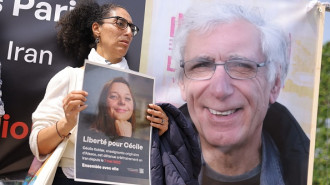US 'temporarily' halts attacks on Islamic State in Syria
US-led coalition forces have not carried out any air raids against IS forces in Syria for three days as of Monday, as Russia intensifies its bombing campaign against Syrian rebel forces and extremists in the north of the country.
According to Pentagon data, the last coalition strike was a drone attack on 22 October that targeted an Islamic State vehicle and a "mortar tube".
Russia, on the other hand, continues to maintain an intense tempo as it nears the end of its first month of bombing in Syria.
The Russian defense ministry said Monday it had hit 94 targets in just the past 24 hours.
US defense officials say Russian sorties have no bearing on coalition actions in Syria, and insist the situation reflects greater discrimination and refinement in terms of which targets are struck.
"It's not because of Russia," said Captain Jeff Davis, a Pentagon spokesman.
"Air strikes ebb and flow... We look at intelligence to find out where we have actionable targets, where we have targets that we can hit without causing civilian damage.
"We simply haven't had any (recently)... but that doesn't mean we are not on the lookout for more - and there will be more."
The US has led a coalition of more than 60 countries that since June 2014 has been conducting regular air raids against IS positions in Iraq and Syria.
As of Sunday, coalition aircraft had carried out a total of 2,679 air strikes in Syria.
According to Pentagon figures, the coalition launched 359 air strikes in July. The number dropped to 206 in August and 115 in September.
Continuing the downward trend, there have been 91 strikes so far this month.
"As we continuously seek legitimate targets, it takes time," said Commander Elissa Smith, a Pentagon spokeswoman.
"The strikes we take are not just randomly against targets; they are part of an organised campaign."
 |
| [Click to enlarge] |
Air raid agreement
Russia and the US last week signed a memorandum of understanding that establishes measures so their pilots steer clear of each other as they conduct separate bombing campaigns in Syria.
Moscow says its bombing campaign that began on September 30 targets IS jihadi fighters and other "terrorists," but the West claims the strikes have focused on moderate rebels fighting Russian-backed President Bashar al-Assad's forces.
Adding to the chaos, a US-led coalition and a Russian task force are conducting parallel but uncoordinated air strikes against Islamist rebels.
Washington sees the root cause of the conflict as Assad's brutality towards his own people and refusal to step aside to allow a political peace process.
But Moscow insists he remains a legitimate leader and that the priority must be the defeat of the Islamic State group and al-Qaeda linked fighters.
Regional power Saudi Arabia and its Gulf Arab allies want Assad to stand down quickly as part of an eventual transition process under an interim unity government.
Kirby acknowledged that Assad's future was "a key sticking point that needs to be resolved".
But Shia powers like Iran, Iraq and the Lebanese movement Hizballah are backing the Assad regime against the mainly Sunni rebels.
Despite their deep disagreements over the cause of the strife, Kerry and Lavrov have taken the lead in trying to find a consensus on how talks could begin.
But progress has been slow and, as fighting continues, tens of thousands of desperate refugees continue to make their way from the region to the shores and roads of Europe.
Syrian exodus
At least 120,000 people have been displaced by fighting in the Syrian provinces of Aleppo, Hama and Idlib since the beginning of October, the United Nations said on Monday.
"This is up from 50,000 we reported last week," Vanessa Huguenin, spokeswoman for the UN's Office for the Coordination of Humanitarian Affairs (OCHA), told journalists in Geneva.
She added that most of those displaced by the latest violence have stayed in their provinces, but others have also fled to camps in the Qah area near the Turkish border.
The conflict has killed more than 250,000 people dead since it broke out in March 2011, sparked by a bloody crackdown on protests against the rule of President Bashar al-Assad.
The conflict has since morphed into a multi-sided civil war with various different actors, with Russia the latest to enter the fray by launching air strikes against forces hostile to its ally Assad.
Moscow announced Monday that it had hit a record 94 Syrian targets over the last 24 hours - including in the Aleppo, Hama and Idlib provinces.
Moscow says it is targeting the Islamic State group and other "terrorists," but Syrian rebels and their backers say Russian strikes have focused on moderate and Islamist fighters, not jihadists.
"People need tents, basic household items, food and water and sanitation services," Huguenin said, adding that aid workers were continuing to mobilise and that six mobile health clinics had been set up in Aleppo to help the wounded.
Meanwhile, IS destoyed have tied captives to Roman-era pillars at Syria's UNESCO World Heritage Site Palymra and blown them up with explosive, according to the Syrian Observatory for Human Rights.





 Follow the Middle East's top stories in English at The New Arab on Google News
Follow the Middle East's top stories in English at The New Arab on Google News

![The law could be enforced against teachers without prior notice [Getty]](/sites/default/files/styles/image_330x185/public/2178740715.jpeg?h=a5f2f23a&itok=xMdFOAIF)
